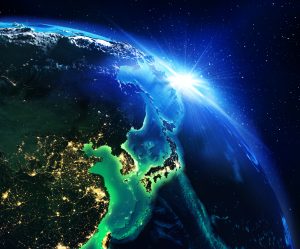In a recent policy speech before Japan’s Diet, Prime Minister Kishida Fumio discussed his plans for Japan’s national security and meeting Japan’s energy goals, but it is important for his government to adopt an energy security strategy that reflects the security situation in the Taiwan Strait.
From the Strait of Hormuz to the Taiwan Strait, hydrocarbon imports from the Middle East travel through maritime chokepoints that can be closed during a crisis, jeopardizing Japan’s energy security and creating reasons for Japanese policymakers to be engaged in regional maritime security matters. The waters around Taiwan are of special concern to Japan’s energy security given the geopolitical tensions between Taiwan and China and Japan’s increasing ties with Taiwan. Japan needs an energy security strategy that prioritizes stability in the Taiwan Strait and energy self-sufficiency. This presents an opportunity for Kishida to address energy security, help meet Japan’s climate goals, and allow Japan to be more assertive in regional security matters.
Should the waters around Taiwan become unsafe for shipping, tankers bound for Japan would be forced to undertake an extended detour, disrupting Japan’s energy supply with immediate impacts. Fuel and electricity prices would rise, eventually leading to shortages and rolling blackouts. Japan does not have sufficient storage capacity to weather a prolonged shortage, especially in the wintertime, meaning that economic and social disruptions would become commonplace. Japan has a strategic petroleum reserve that can meet its consumption needs for 90 days and could alleviate some of the disruptions, but it is not a long-term solution and can only be used during a national emergency. Accessing the reserve would require a national emergency declaration concerning the crisis. With the reserve only used in the past during wars in the Middle East or natural disasters in Japan, it is unclear what legal footing the government would have to tap into it over a shipping blockage in Asia. At minimum, an emergency declaration could further escalate the situation and cause panic in Japan.
Given how this threatens Japan’s security, it is critical that the National Security Strategy review announced by Kishida include a strategy to improve Japan’s energy security. An energy security strategy is an opportunity to address this challenge by setting goals of maintaining stability in the Taiwan Strait and diversifying Japan’s energy supply. This strategy would complement a revision to Japan’s Strategic Energy Plan that sets out steps toward Japanese energy self-sufficiency, introducing a national security-oriented perspective focused on the Taiwan Strait.
Japan’s support for stability in the Taiwan Strait has strong foundations, and relations with Taiwan have grown closer in the past several years. Kishida has noted that the Taiwan Strait is likely to be Japan’s next security challenge, and the best way for Japan to support stability is to continue to increase engagement with Taiwan on the issues that have driven the improvement in ties. Better relations between Japan and Taiwan, especially on security issues, will bring Taiwan further into the international community and demonstrate a united front behind Taiwan, which will strengthen deterrence against China seeking to change the status quo in the Taiwan Strait. This will lower the risk of disruptions to shipping and give Japan an increased stake in how an emergency in the region would play out – a win-win for a country that often punches below its weight in international security affairs.
It is also important for Japan to consider how to protect the shipping lanes around Taiwan in a crisis. This should be included in Japan’s Remote Island Defense Plan and it should be a part of strategic planning between the United States and Japan for responding to a Taiwan Strait contingency. It should also be addressed within the Japan-Taiwan-U.S. strategic dialogue.
In the long term, Japan must reduce the risk of relying on imports for its energy security and ability to respond to regional flashpoints. Japan must create a situation where the Japanese Self-Defense Forces (SDF) can operate without depriving civilian society of its energy needs. This can be done by fulfilling the Ministry of Defense’s plan to use 100 percent renewable energy at SDF facilities by 2030 and by diversifying Japan’s energy sources. Avenues for this include greater investment to exceed Japan’s current goal for offshore wind generation by 2030 and revisiting the reactivation of Japan’s nuclear power stations, which has been a slow process since the 3/11 triple disaster. Such plans would also have the benefit of helping Japan meet its goal of reducing carbon emissions by 46 percent before 2030.
If the Kishida administration enacts an energy security strategy focused on supporting Taiwan and diversifying Japan’s energy sources, it will not have to fear energy shortages that put Japan’s security at risk. It will also improve Japan’s security without enduring a political battle over increasing the defense budget. This will make Japan a more confident actor in protecting Indo-Pacific security.

































